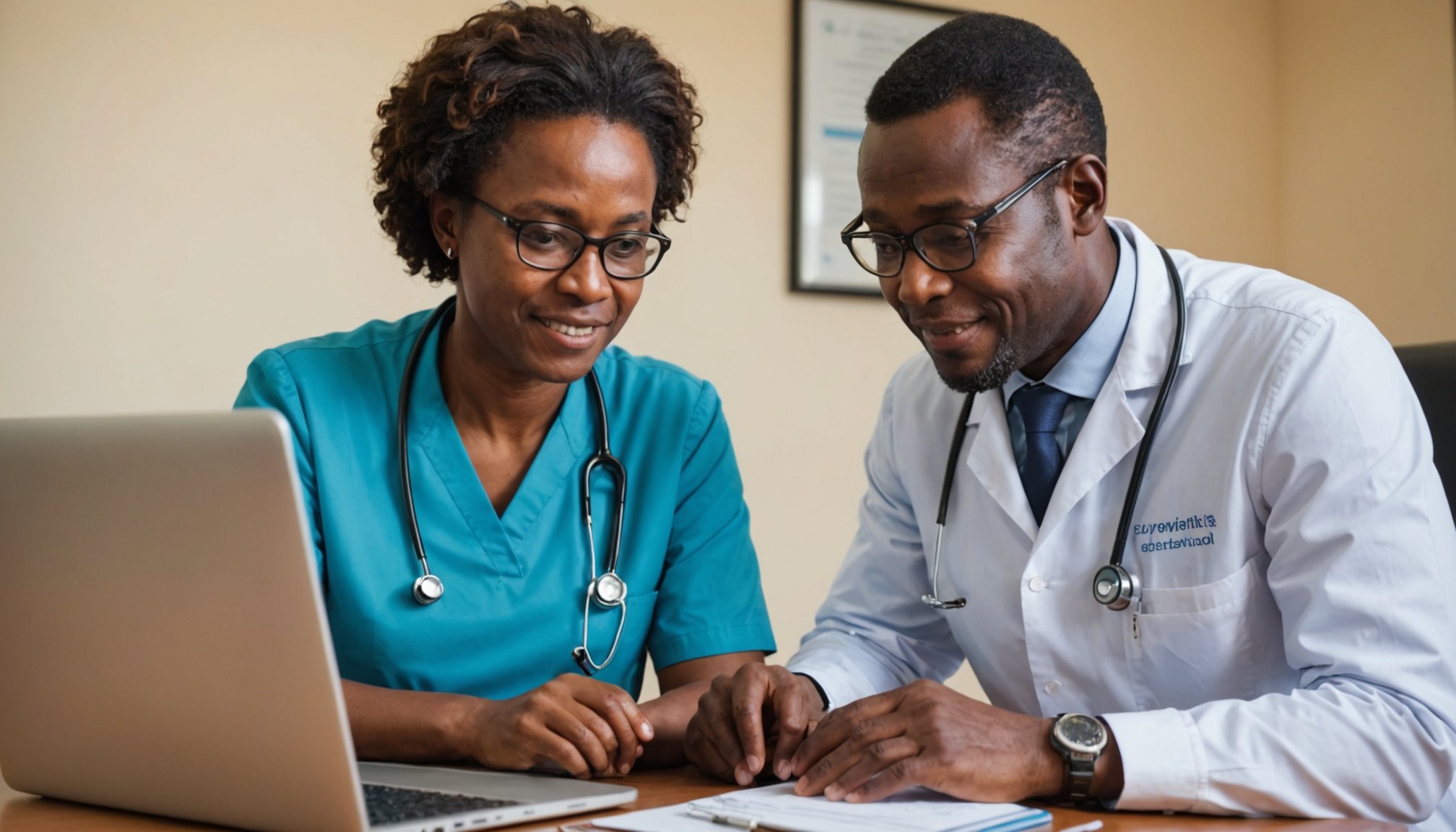Unleashing Opportunities: The Growth Potential of UK Tech Companies in Africa’s Telemedicine Sector
The African Healthcare Landscape: A Vast Opportunity for UK Tech
Africa, with its diverse and rapidly growing population, presents a significant opportunity for innovation in the healthcare sector. The continent’s healthcare systems face numerous challenges, including limited access to medical facilities, a shortage of healthcare professionals, and inadequate infrastructure. However, these challenges also create a fertile ground for technological solutions, particularly in the realm of telemedicine.
Telemedicine, which involves the use of telecommunications and virtual technology to deliver healthcare remotely, has been gaining traction globally. In Africa, this technology is not just a convenience but a necessity. With over 1.2 billion mobile connections across the continent, mobile networks have become the primary gateway to the internet and vital services such as mobile banking, telemedicine, and e-learning[3].
Also to discover : Comprehensive handbook to navigating uk legal regulations for starting your cryptocurrency exchange
The Role of UK Tech Companies in Africa’s Telemedicine Sector
UK tech companies are well-positioned to capitalize on this opportunity due to their advanced technological capabilities and innovative spirit. Here are a few ways these companies can make a significant impact:
Leveraging Advanced Technologies
UK tech companies can bring cutting-edge technologies such as artificial intelligence (AI), edge computing, and private 5G networks to Africa’s telemedicine sector. For instance, AI can be used to develop new diagnostic tools, personalized treatment plans, and virtual health assistants. This can significantly enhance the efficiency, accessibility, and accuracy of healthcare services in Africa[1].
This might interest you : Innovative approaches to reducing carbon emissions in uk logistics: sustainable solutions for an eco-friendly tomorrow
Key Technologies:
- Artificial Intelligence (AI): AI can analyze vast amounts of medical data to provide accurate diagnoses and treatment plans.
- Edge Computing: This technology enables real-time data processing and decision-making at the source, which is crucial for remote monitoring and telemedicine.
- Private 5G Networks: These networks offer secure, low-latency, and scalable solutions, ideal for industries that require high-performance connectivity.
Enhancing Digital Health Infrastructure
The integration of mobile networks and digital health technologies is transforming Africa’s healthcare landscape. UK tech companies can collaborate with local telecom operators to optimize mobile networks, ensuring faster speeds and lower latency. This is particularly important for telemedicine, which requires seamless video communication and real-time data transmission[3].
Examples of Successful Collaborations:
- UnoTelos and Niral Networks: This partnership aims to bring private 5G and edge AI technologies to Africa, focusing on sectors like telemedicine and autonomous systems[2].
- Safaricom’s AI-Driven Network Tools: In Kenya, Safaricom has invested in AI-driven network tools, setting new benchmarks in service quality and ensuring reliable mobile connectivity even in remote communities[3].
Market Potential and Growth Projections
The digital health market in Africa is projected to grow significantly in the coming years. Here are some key statistics and projections:
Market Growth
- The digital health market in Africa is expected to grow by 15.42% between 2023 and 2027, reaching a market volume of $10.42 billion in 2027[1].
- The global telehealth and telemedicine market was valued at $113.28 billion in 2023 and is expected to reach $462.19 billion by 2030, growing at a CAGR of 24.02% from 2020 to 2023[5].
Key Market Segments
- Telehealth and Telemedicine: These segments are experiencing rapid growth due to technological advancements, changing healthcare needs, and supportive government policies[5].
- mHealth: Mobile health applications are driving the market, with a significant focus on well-being, fitness, and routine health monitoring[4].
| Market Segment | 2023 Value | 2027/2030 Projection | CAGR |
|---|---|---|---|
| Digital Health (Africa) | $7.14 billion | $10.42 billion | 15.42% |
| Telehealth and Telemedicine (Global) | $113.28 billion | $462.19 billion | 24.02% |
| mHealth (Global) | Dominant segment | Expected to continue growing | – |
Practical Insights and Actionable Advice for UK Tech Companies
For UK tech companies looking to venture into Africa’s telemedicine sector, here are some practical insights and actionable advice:
Understanding Local Needs
- It is crucial to understand the specific healthcare challenges faced by different African countries. For example, South Africa has a more developed healthcare system compared to some Sub-Saharan African countries, but all face unique challenges such as limited access to healthcare facilities and a shortage of healthcare professionals.
Building Local Partnerships
- Collaborating with local telecom operators, healthcare providers, and government agencies is essential. These partnerships can help in navigating regulatory environments, understanding local needs, and ensuring the sustainability of the solutions provided.
Investing in Digital Skills
- There is a need to invest in digital skills training for healthcare professionals in Africa. This includes training on the use of telemedicine platforms, data analysis, and other digital health technologies.
Leveraging Data for Better Healthcare
- The use of data analytics can significantly improve healthcare outcomes. UK tech companies can help in developing systems for collecting, analyzing, and using health data to provide better clinical support and services.
Quote from Matshepo Sehloho, Associate Editor at Connecting Africa:
“Africa has been witnessing a lot of growth, and its healthcare ecosystem is no exception. The future of healthtech in Africa is very bright, and as a growing number of startups and established companies keep developing innovative solutions, we will likely see significant improvements in healthcare access and affordability on the continent in the coming years.”[1]
Overcoming Challenges and Ensuring Sustainability
While the opportunities are vast, there are also several challenges that UK tech companies need to address:
Infrastructure and Connectivity
- One of the primary challenges is the lack of robust infrastructure and reliable connectivity in many African countries. Private 5G networks and edge computing can help mitigate these issues by providing secure and low-latency connectivity solutions[2].
Regulatory Frameworks
- Navigating the regulatory environment in Africa can be complex. UK tech companies need to work closely with local authorities to ensure compliance with all regulations and to advocate for policies that support the growth of telemedicine.
Social and Cultural Barriers
- There may be social and cultural barriers to the adoption of telemedicine. Educating the public about the benefits of telemedicine and involving local communities in the development process can help overcome these barriers.: A Bright Future Ahead
The growth potential for UK tech companies in Africa’s telemedicine sector is immense. With the right approach, these companies can not only drive economic growth but also improve healthcare outcomes across the continent.
Quote from the OneSafe Content Team:
“The integration of Private 5G and Edge AI could help industries innovate, drive economic growth, and bridge socio-economic gaps. This partnership could be a significant step forward for connectivity in Africa.”[2]
As Africa continues its digital transformation journey, the role of UK tech companies in enhancing the telemedicine sector will be pivotal. By leveraging advanced technologies, building local partnerships, and addressing the unique challenges of the region, these companies can help create a more accessible, efficient, and sustainable healthcare system for millions of Africans.
In the long term, this collaboration can lead to universal healthcare access, improved health systems, and a healthier population, ultimately contributing to the overall development and prosperity of African countries. The future is indeed mobile, and with the right strategies and partnerships, UK tech companies can be at the forefront of this transformative journey.











